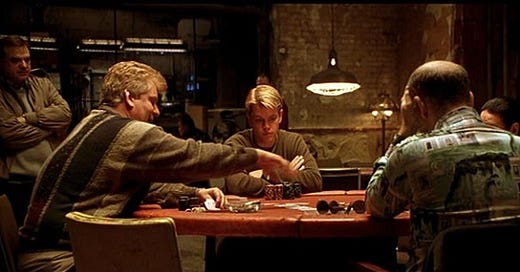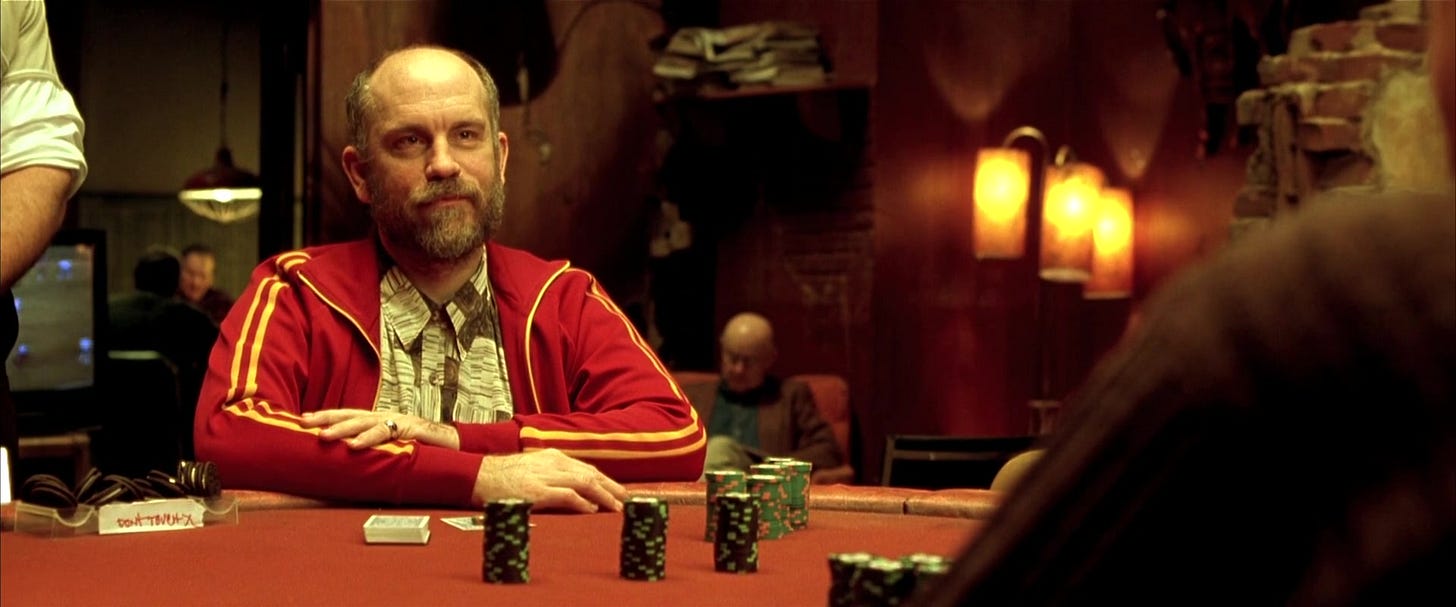Lessons from >1,500,000 hands of poker: part 2
what i learned from investing >10K hours in the game and how it applies to building
Today at a glance:
results-oriented vs. expected value (EV) thinking
intellectual honesty and ownership
discipline and emotional awareness
learning and adjusting our belief system (bayesian thinking)
Here we looked at why we can learn a lot from poker (patterns are everywhere) and 4 lessons from poker that apply to business, product, teams.
Let’s do 4 more:
#1 Results-oriented thinking vs. expected value (EV) thinking:
Business and life is often about results. What did you get? How much did we make here? What was the outcome of this action? Did you fail or succeed? That’s good. Results matter, but there is not enough attention on the work that led to the outcome. Not enough appreciation for the process.
What is the problem with results-oriented thinking?
It rewards events outside of our control. Life is fickle. We talked about how humans are bad at estimating black swan events. Shit happens. So we can make the best product, miss the timing window and the market closes around us. Or we work really had to find/close our dream candidate and an immigration issue ruins it all. Obstacles outside of our control are everywhere around us. The 2 things we can control are our actions and our attitude. This is the work leading up to the results.
It can bring us down. Because shit happens, we can’t be deterred by issues. We need grit and we need to keep moving. We need to find a way to derive positive momentum from failure. Stuff will fail. That is okay. If we gave 10/10 effort and thought deeply about the problem, but it didn’t work out - I think it’s worth celebrating. This is especially important for cultures that values speed and innovation.
It is short-term. Long-term thinking will reward those who keep pushing.
In poker the result in each hand is a composite of our actions and of probability. Let’s take an extreme example:
each player has $1K USD assume this is an unknown player and we have no reads our hand: K10 our opponent: AA pre-flop: we raise, our opponent re-raises, we go all-in, they call board runs out: 10X10,Y,Z where XYZ are random cards irrelevant for this example result = we win $2K pot with 101010KX vs their AA1010X our equity before the flop vs. AA was ~12.5%, meaning if we run this scenario 1M times - we are losing money ~87% of the time. A -EV move. our equity before the flop vs. a range of hands that this opponent may go all-in with was also low. We are also losing $. Again -EV, even though we wonWhat happened here? We made a move and won. The result is that we won. Did we make the best expected value play? No. Our expected value was 12.5%. Did we win because we played well? No - we got lucky. Luck is part of life. Black swan events can be both positive and negative, but the larger point is that luck is not within our control. We can play our best, maximize expected value in each of our actions, and still lose in the short-run. After we think through the problem and we put the chips in the middle - we need to let go. Let go and let variance/probability decide the outcome.
Let’s ditch results-oriented thinking and start thinking of things in terms of expected value.
#2 Intellectual honesty and ownership:
In the example above what are the consequences of attributing this win to our actions? What happens to us long-term if we go to play higher-stakes against smarter opponents and keep going all in with K10? What if we are the guy with the AA and we put in the money with the best starting hand and loose? In fact, we played our A-game all night vs. this opponent - thinking deeply about each scenario, adjusting, and making moves and we still lost. Probability was on his side that night. What does it mean for our psyche if we attribute our loss that night 100% to our actions?
In poker it’s important to be intellectually honest about the outcomes and to own every aspect of your game. Are we losing b/c we are making mistakes or b/c we are getting unlucky? Winning players think through all of this. Why do I lose vs. this specific player? Why do I keep struggling in this specific scenario? How do I end up here and how can I adjust my strategy? Winning players do not blame bad cards for bad outcomes or hope that good cards come. They shrug off the variance, think about their actions, and focus on what they can control.
The same applies to building a product or a company. Think it’s really important to be honest about the situation. What is actually happening? What do I need to do to win and how much of this is within my control? One of the mistakes a founder can make right now is to hope that the economy will recover quickly and/or that the next funding round will bail the company out. The same goes for ownership and taking responsibility over all aspects of the business. What % of the companies during the pandemic attributed their success or rising valuations to their decisions vs. market factors?
Taking ownership and being intellectually honest about what is happening and then making adjustments is identical in both poker and business.
#3 Discipline and emotional awareness:
In poker there is a term called tilt. Tilt is when a player takes on a suboptimal strategy because of emotions or frustration. In the movie Rounders, Matt Damon’s character puts his opponent (red tracksuit in photo below) on tilt by letting him know that he discovered his tell. This is a movie, but the point is that Damon’s character threw him off of his game and the red tracksuit guy lost .
So tilt is when we are emotionally off kilter. When we are not playing our A-game we start to make -EV (expected value) decisions. The worse our state, the larger the negative pay-off. Out of frustration or anger we can lose a lot. Some of the largest losses in sheer $ terms I’ve ever seen at the table happened when people were tilted - not when they were just unlucky. Understanding when someone is in a subpar state and extracting maximum value from them can be profitable. Understanding when we are not 100% and quitting can be even more profitable (loss minimization). In fact, discipline and emotional awareness is stated as the #1 source of edge among high stakes poker players. Discipline is ranked higher than hand-reading, game-theory, work ethic etc.
How does this apply to building? So many ways. If we are cognizant about our emotional state - we can make better decisions or we can take specific actions to alter our state. If we are leading a company or a team - it is important to take active ownership over how we feel. Not feeling good? Get to the bottom of this and get back on track because the leverage of our role is high. It can lead to bad decisions and/or ripple through the company. In my late 20s I was given feedback several times that how I show up in office rubs off on others. If I appear stressed - people start to stress. I am grateful to the person that shared that with me and I’ve tried to make changes. Another obvious outcome is the quality of our decisions. Can’t make tough calls when we are not 100%.
The point I am trying to make is not to ignore emotions. The point is to observe the emotions. Let them pass through you. Be cognizant when things are affecting our mood, exterior, and decision making ability. And then take action. An action can be a workout or outright quitting for the night (#1 solve in poker is to quit the game when tilted).
Learning and adjusting our belief system:
Those who succeed in poker are always learning. My approach is to treat every scenario as a learning opportunity. Avoid going from hand to hand in a daze. You do not want to be a tourist at the table - just along for the ride. You want to be thinking deeply about every instance, extracting information, and adjusting your strategy.
Why did she just win that hand? How could I have done better in that scenario? We want to approach everything with a mindset of: what can i learn from this to maximize future value. And so I imagine everything as a learning step. And every scenario is a step on an infinite staircase towards maximum pay-off. Towards mastery.
The same mindset applies to business. There are formal retros/processes for learning after each release or after an outage. These are great. They are sometimes heavy, but they are good. Beyond retrospectives - I think it’s important to have a learning culture that transcends everything, not just select large releases and outages. This hire we all said yes to is not working out. How can we tune our interview or onboarding process to do better? We noticed XYZ development in our space - what does this mean for us and how should we adjust our strategy to win?
In the long run you win money in poker by collecting information and using that information to adjust your strategy. Poker is an obsessive hunt for information and a never-ending process of strategy evolution. Think the same mindset applies to business. Observe → collect information → put it to use → adapt belief system → win.





